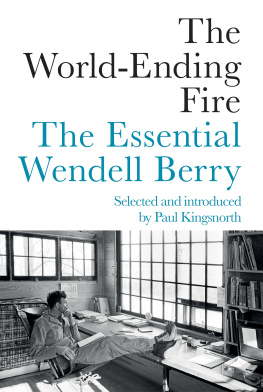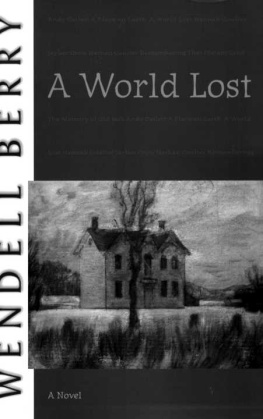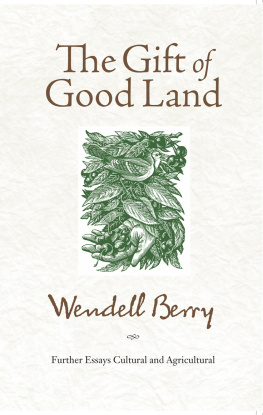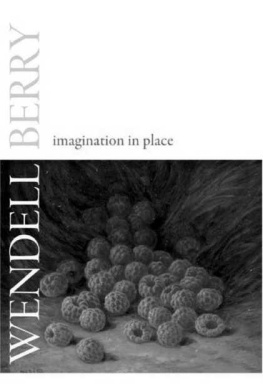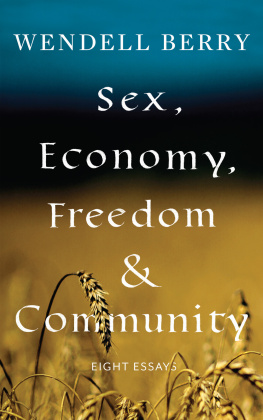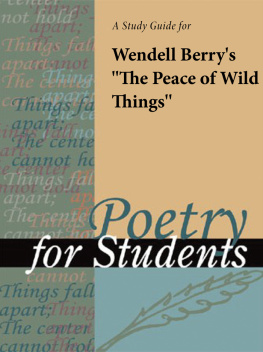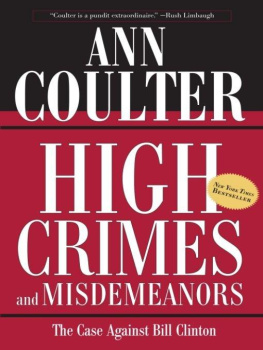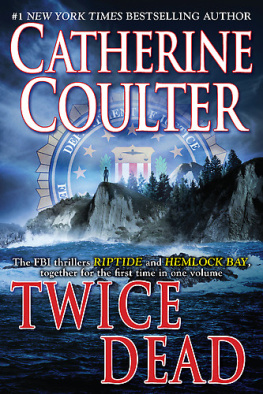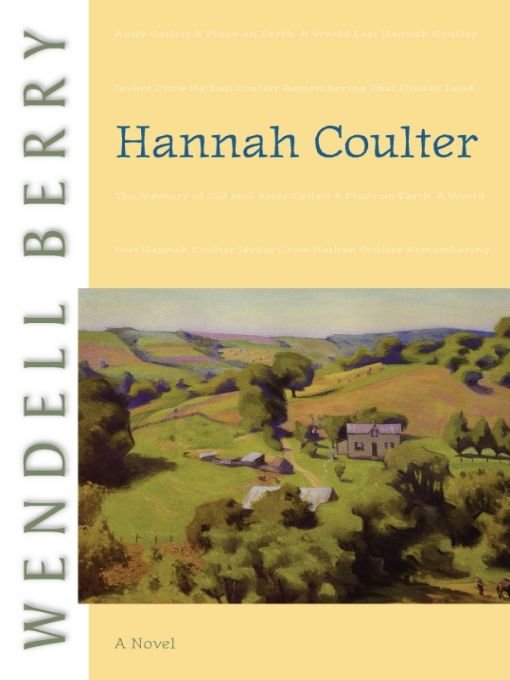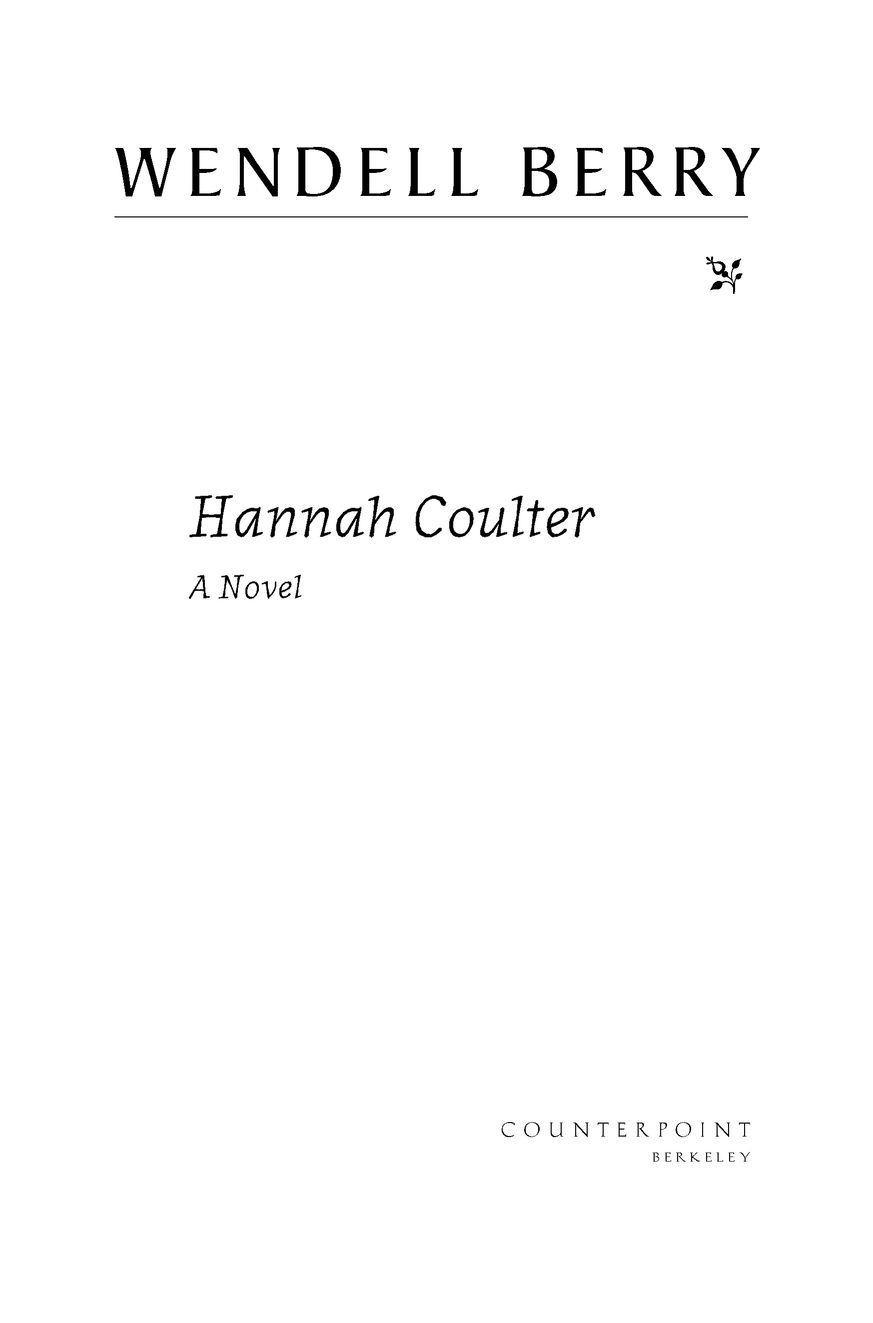Table of Contents
Other Books About the Port William Membership
Andy Catlett
Jayber Crow
The Memory of Old Jack
Nathan Coulter
A Place on Earth
Remembering
That Distant Land
A World Lost
This book is given in gratitude
to Tanya Amyx Berry
Have drawn at last from time which takes away
And taking leaves all things in their right place
An image of forever
One and whole.
Edwin Muir
Part I
The Story Continuing
I picked him up in my arms and I carried him home.
So Nathan would end the last of the stories of his childhood as he told it to our children.
This was in 1940. Nathan was sixteen. He and Jarrat, his dad, his dads brother, Burley, and his grandpa Davethe three of them had gone down into the river bottom, taking a team and wagon, to help a neighbor put up hay.
It was hot weather, hay weather, the last of July. Dave Coulter, whom I too learned to call Grandpa though I never knew him, was eighty years old, no longer much use for work. While the younger men loaded and hauled in and unloaded the hay, Grandpa Coulter puttered about, or sat in the shade and slept, or carried water to the others when they needed a drink. Toward the middle of the afternoon he had one of the sick spells that he called miseries, and Jarrat told Nathan, Walk home with him. Help him along. Take care of him.
The two of them went up the hill together, stopping often. When they had got almost home, Grandpa staggered and went down, and couldnt be wakened. Nathan was a big boy by then, strong, and he gathered Grandpa into his arms and carried him the rest of the way up to the house where Grandma Coulter, whom I do remember a little, hurried to open the door and to make a place to lay him down.
Nathan thought of that, I am pretty certain, as the last day of his boyhood. Past that day he told no more stories about himself. From then on he was in his own estimate and in his deeds a man who lived and worked as a man with his dad and his uncle Burley, expecting to go on working in the same place at the same work for the rest of his life. His older brother, Tom, had left home, but Nathan wanted to stay. He had not thought of going away or, yet, of marrying.
But then, pretty soon, the war came. Tom and then Nathan were called into the army. Tom was killed as the fighting passed up through Italy. Andy Catlett went there years later and found his grave. It was in a valley not far outside of Florence, a field of white crosses, row after row, gathered in the quiet.
Nathan didnt cross the waters, as they used to say here, until the spring of 1945. And then he went pretty straight into the Battle of Okinawa, and lived, and was unhurt, and came home.
But his stories about himself stopped at the death of Grandpa Coulter. He would tell our children the stories of his childhood, mostly of the things he and Tom had done. They did a lot of things, and saw and went through a lot of things, some funny and some sad enough.
All I know of Tom Coulter I know of him as a boy in those stories Nathan told. Of Tom as a grown young man, as a soldier killed in the war far from Port William and forever gone, nobody spoke. I knew they didnt speak of him as they last knew him, living and so near his death, because they couldnt. And I understood why. They had got into the habit of silence because for too long after he died they couldnt talk about him without weeping out loud. And so he lives on now in my mind as a boy in old stories told to children.
Of Nathan himself, from the time when he and Tom roved about and played and worked together as boys, until after the warwhen I turned aside from grief for the husband I had, who also was lost in the war, and finally could love Nathan and marry himI know, beyond what I have learned to imagine, almost nothing.
He was, anyhow, a quiet man who never had much extra to say. He had stories enough, about Burley and Big Ellis and Tol Proudfoot and others, mostly funny. But about himself, about the coming of the war and his time in it, though he would say something occasionally, not much, not often, he told no stories. If the subject came up, he was apt to say, Ignorant boys, killing each other, or something else about that short. And then, looking away, he would shake his head and say no more. Over the years I heard him say enough to know he didnt like the power of some people to say whether other people will live or die. He didnt like the idea of killing women and old men and children, or of destroying the world in order to kill people, or of great machines made only to kill people. What he did and what happened to him in the war, I dont know. While he was alive I couldnt ask him. After he was dead I learned what I could, and more than I could easily bear to know, about the Battle of Okinawa where he fought.
His story after the war, and especially after 1948, I know because it is my story too. It is our story, for I lived it with him. It is the story of our place in our time: our farm of 150 acres more or less, as the deed says, on the ridges and slopes above the creek known as Sand Ripple that runs down from Port William to the river. Nathan bought it in that year of 1948, hoping I would marry him, or in case I would, thinking he would need a place of his own to take me to.
Our story is the story of our place: how we married and came here, moved into this old house and made it livable again while we lived in it; how we raised our children here, and worked and hoped and paid the mortgage, and made a pretty good farm of a place that had been hard used and then almost forgotten; how we continued, making our life here day by day, after the children were gone; how we kept this place alive and plentiful, seeing it always as a place beyond the warNathan seeing it, as I now think, as if from inside a fire; how we got old, and Nathan died, and I have remained on for yet a little while to see how such lives as ours and such a place may fare in a bad time.
This is the story of my life, that while I lived it weighed upon me and pressed against me and filled all my senses to overflowing and now is like a dream dreamed. So close to the end now, what do I look forward to? Today shalt thou be with me in paradise. Some morning, I pray, Ill have the good happiness of the man who woke up dead, who Burley Coulter used to tell about.
This is my story, my giving of thanks.
A Steadman
I was a Steadman from up in the ridges behind Hargrave. Dalton and Callie were my parents, and I was their only child. We lived on a rough farm that had belonged, since my grandfathers death, to my grandmother. My father, her youngest son, farmed it as her tenant. We lived with my grandmother in her house, an old farmhouse of the usual kind: four rooms in front, divided upstairs and down by a wide hall, with another four rooms in an ell at the back. The farm had built the house but in those hard times was unable to maintain it. It was bare-boned and paintless, the weatherboard bleached and rain-stained. In places the stones of the foundation had sprawled from under the sills. The tall rooms were wonderfully cool in summer, but in the winter they were drafty and hard to heat. On windy days you could sit right by the stove and your back would be cold.
My grandmother was Arvinia Steadman. I called her Grandmam. She was good to us, and all of us got along. She and my mother shared the housework, and they helped my father with the farmwork too when they were needed, like most farm women. We would all be at work together, sometimes with neighbors, in the plantbeds in the spring, in the harvest times of summer and fall, and in the stripping room in the winter. We worked hard, before day to after dark, and I helped and had my own jobs to do from the time I was five or six years old. The times were hard, and they got worse. I was seven when the Depression hit and eight in the terribly dry summer of 1930 when we drove the stock two miles to water.


